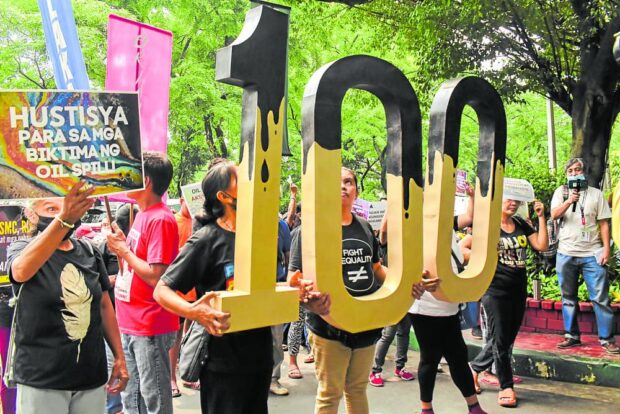
CALL TO ACTION Members of the environmental group Protect the Verde Island Passage stage a rally in front of the office of the Department of Environment and Natural Resources in Quezon City, in this photo taken on June 8, to renew their call for the fragile marine corridor to be declared as a protected area and for the government to provide a lasting solution to families affected by the spill. The protest is held 100 days after the sunken MT Princess Empress spilled toxic oil that hit Oriental Mindoro and nearby areas. —PHOTO COURTESY OF PROTECT VIP
LUCENA CITY — Four months after tanker MT Princess Empress sank off the waters of Oriental Mindoro and spilled toxic fuel oil into the sea, affected residents were still waiting for “concrete” government actions on how to prevent the same from happening again, which placed the Verde Island Passage (VIP) in constant threat from such a disaster, an environmental group said.
Protect VIP, in a statement on Wednesday, said President Bongbong Marcos promised to resolve the devastating oil spill in Oriental Mindoro in four months but “communities and coastal and marine life continue to suffer damage” and “there are also still no concrete policy or legislative measures put in place to ensure that no such disasters take place in the future.”
On Feb. 28, MT Princess Empress sank while carrying some 800,000 liters of industrial fuel in the waters of Naujan town and caused a massive oil spill that affected coastal areas in Oriental Mindoro and Batangas, both of which are within the VIP corridor, and also those in Antique and Palawan provinces.
Fishing ban
Fisherfolk continued to suffer as the fishing ban ordered by Gov. Humerlito Dolor in Oriental Mindoro’s affected areas, while it had been lifted in other parts of the province, was extended in the hardest-hit town of Pola, the provincial public information officer (PIO) said on Tuesday.
Citing the latest testing of the sample waters in Oriental Mindoro by the Bureau of Fisheries and Aquatic Resources, the PIO said the fishing ban in Pola had to stay due to the presence of toxic polynuclear aromatic hydrocarbons in its waters. Polycyclic aromatic hydrocarbons are a class of chemicals that occur naturally in coal, crude oil, and gasoline.
The PIO said the fishing ban was lifted in Naujan and Pinamalayan towns. Fishing and water sports were also allowed to resume in the waters from Naujan to Puerto Galera and from Pinamalayan to Bulalacao towns.
On June 17, the Philippine Coast Guard said it had completed siphoning off the remaining oil from the sunken tanker.
Marine corridor
But Protect VIP believed that only by including the VIP in the Expanded National Integrated Protected Areas System Act of 2018 that its waters and rich marine resources, the lifeblood of thousands of fishing families, could be protected.
The VIP is a 1.14-million-hectare marine ecosystem located off the coastlines of Batangas, Romblon, Marinduque, Occidental Mindoro and Oriental Mindoro provinces. It was recognized as the “center of global shorefish biodiversity” due to the high densities of marine resources in the area, based on a 2005 study by American marine scientists Dr. Kent Carpenter and Victor Springer.
Protect VIP lamented that VIP has now become the “epicenter” of fossil gas and liquefied natural gas (LNG) developments in the country, as eight of the 27 proposed new plants and seven of the nine planned LNG terminals in the country are located in Batangas.
The group warned that allowing fossil gas facilities in Batangas exposed the VIP to the frequent entry of LNG barges, and the inadvertent oil spills or disposal of shipboard liquid wastes and bilge water.
“This was not the first oil spill in the VIP, and it is unlikely to be the last as long as toxic and dangerous cargo is ferried in these waters,” said Gerry Arances, executive director of the think tank Center for Energy, Ecology, and Development and the co-convenor of Protect VIP.
On July 13 last year, Senators Cynthia Villar and Loren Legarda filed a bill creating the “Verde Island Passage Protected Seascape” but the measure remained pending in the Senate.
—REPORTS FROM DELFIN T. MALLARI JR. AND MADONNA T. VIROLA
READ: Mindoro oil spill ruins nearly P1 billion in livelihood sources